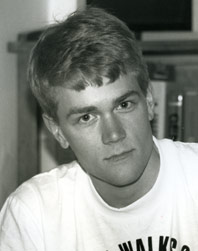Jay BonnarDifficult yearsNOVA: When you watch footage of yourself going through medical school, what are your thoughts overall? Jay Bonnar: Looking back, those years were not particularly easy. I have a lot of empathy seeing myself going through it. It's nice to be in a different place now. Q: Why was it stressful for you? Jay: The process of becoming a doctor was not easy for a lot of reasons, some having to do with me, and some having to do with the profession and how hard it is to master. Part of it was my sense that I was probably not going to be a surgeon or a primary-care physician. I was interested in different aspects of medicine than the norm. I remember as an intern, I felt that it was wrong of me to place central lines, to put a catheter into one of the central veins through the neck. It's somewhat risky, and I felt it was really wrong of me to be practicing that skill, because I knew that I was going to be a psychiatrist. There were many instances where I felt this sort of tension. Another thing that's changed is that I'm older. [laughs] I've had a whole bunch of therapy and also performed a lot of it, and I've learned a great deal. I'm more relaxed than I used to be, not that you would know it, since I'm less fond of the camera than I used to be. Q: Why is your work now less stressful? Jay: It's a lot less stressful when you know what you're doing. When I come to work each day, I know that I'm up to the task. I've got the skills. I'll be okay, and my patients, for the most part, are gonna be okay. Q: So you don't worry so much about making mistakes. Jay: Yes, and given my tendency toward perfectionism, I'm fortunate not to work in a field where there are very set protocols for the right way to do something. In my field, there's a lot of grey. There's good and bad to that. You can never be sure that you've done everything right, but on the other hand, you're also not confronted with a stark sense that you've clearly done something wrong. Q: Do you think people watching the earlier films got an accurate impression of you? Jay: I think I may have come across as a person from a rather privileged background. That hasn't been the perspective from my shoes. I moved around the country an awful lot as a child. I was shy by nature, and with each progressive change, I got shyer and shyer, so by the time I hit junior high and high school, I was really an outsider. I was very introspective, very shut off, and it's been a long journey of finding a way out of that. In a better placeQ: Looking back at your first marriage, do you think it's risky for medical students to get married? Jay: Marriage is a risky thing for everyone. [laughs] Is marriage riskier because one is a medical student or a doctor? It's unclear to me. I'm currently happily married, and my present career works fine for my marriage. Certainly, both in medical school and as a practicing physician, people have demands on their time and their mental energy that can pull them away from their whole social world—friends and family and partners. I chose the path I did, in part, because I wanted to have a life outside of my work. I think a fair number of doctors love sinking themselves into work and make that the centerpiece of their lives. It's a big piece of my life, but it's not by any means the only thing in my life. Q: Was the all-consuming nature of medical school hard for you? Jay: It was intense. I had loved college and the liberal arts atmosphere. I took a whole variety of different classes—language and sociology and science and art. In medical school, you learn a big but quite specific body of knowledge. And I really didn't like the blinders that one puts on in medical school. In psychiatry, I'm back in a field where the focus is humanity in its broadest sense. That's the way I like it. "When I started training, it did seem sort of voodoo-ish. How does this help people?" Q: What are the various facets of your work life now? Jay: Mostly I work in private practice here in my office in Belmont [Massachusetts] and see patients in psychotherapy, which is face-to-face in chairs. I have a very limited practice of psychoanalysis, for which I'm still in training. I also work at McLean Hospital in the outpatient department. There I do a lot of group psychotherapy, and I really like that work a lot. Q: Do you specialize in the treatment of a certain type of patient? Jay: In my part of the outpatient department at McLean, we specialize in the treatment of personality disorder. People with personality disorder have a great sense that they are outside of mainstream culture looking in. It's a position I very much identify with. And they're people who struggle with very intense self-reflection, very intense emotion, painful relationships, all of which I can relate to. Q: Are these conditions difficult to treat, to really help? Jay: It's been very exciting to see recent research suggesting these are very treatable conditions. Over a small number of years, people can really make quite dramatic changes. Healing the troubledQ: You must see a lot of people in your work who are in pain, mental anguish. Is it hard to witness this and stay happy yourself? Jay: There is an ancient theological and philosophical question: How can one have joy in the presence of misery? Some people try to tune the negative out and just live their own private lives. That doesn't work for me. I don't want to be disconnected from the pain of the world. But it's a challenge to figure out how to have a connection to what's hard and challenging in life and at the same time to not get depressed and pessimistic, but instead to be life-affirming, optimistic, joyful. I'm still working on that. Q: What sort of connection do you make with your patients? Do you try to stay detached? Jay: There's almost a universally held public misconception about therapists, that we're very detached. In fact, therapy is very much about making a connection. Part of the misconception probably has to do with the image of therapists through the 1950s and '60s, when the psychoanalytic community practiced a particularly spare form of psychotherapy, with therapists being quite silent. The role requires that we focus on the patient. For those of us who are doing a good job, that's what we do. But that's very different from being disconnected. It's about being highly engaged with another person, but at the same time keeping the focus very much on them. I don't think that happens anywhere else in life. It's not like a friendship, for example. Within the field, it's sometimes compared to a parent-child relationship, because that's another situation where a person is deeply connected to another person but also has a caring obligation for that person. But I think that analogy is too paternalistic. Q: Do you share much about yourself with your patients? Jay: No. There are big debates in different practices of therapy as to whether one should share one's own life stories. My tradition tends toward the side of not being very self-disclosing. What I'm doing here now is, of course, a big exception. But in the course of therapy, I'm very unlikely to be self-disclosing. I think that style works well for me personally, and it also has a fair amount of theoretical support behind it. On the other hand, I know plenty of clinicians who use self-disclosure, and it works well for them. Changes in medicineQ: There's a big debate in psychiatry, as you know, about the use of medication versus talk therapy. What's your take? Jay: I have very conflicted feelings about medication in psychiatry. On the one hand, I think it can help some people a great deal. For some people, it's literally lifesaving. On the other hand, I very strongly feel that we as a culture broadly—not just as Americans or as doctors—we look too much towards medications to solve problems. We assume that the negative effects of medications are trivial, but almost every medication I use has substantial side effects and risks. Q: What do you think of the influence that drug companies have in medicine? Jay: I feel strongly about this. I've gone out of my way not to have much interaction with pharmaceutical representatives. The influence of these companies not just on the prescribing side, but on the research side—what gets funded, what doesn't get funded—is very problematic. For example, in psychiatry there are lots of different drugs that are almost identical to one another but get marketed as though they were substantially different. It creates a lot of confusion for patients. It creates a lot of confusion for clinicians. It creates a lot of unnecessary cost. "You become a better therapist by doing it. That's an existential fact." Q: Do you feel that you have less status in society than, say, your father or your grandfather had as doctors? Jay: Absolutely less status than my grandfather. My grandfather worked in the heyday of medicine. He was a general practitioner in a small town, and he was revered as a deity. He practiced at a time right after the introduction of both anesthesia and antibiotics, which took doctors from being close to charlatans to being people who were able to offer lifesaving treatments. I think physicians are viewed by the public now with a great deal of skepticism and a sense that we're seeking our own advantage. Unfortunately, I think we doctors have had a fair degree to do with that change in image. Q: Are you unhappy with the fall in status? Jay: There was a time earlier in my career when I was really unhappy about the falling status, both economically and socially, of doctors in America. I felt like I had made an enormous sacrifice to be one, and to find myself treated like a cog in a big health-care machine was very unpleasant. I think that was partly my own arrogance. Now I've been able, to a much greater extent, to accept that the role of medicine in America has changed. It's probably for the better. We're not gonna get anything like universal access to health care in this country if doctors are being compensated like CEOs. The decline of psychoanalysisQ: Where do you see yourself in 10 years? Jay: It's very hard to say. Ten years ago, I imagined myself being a psychoanalyst with a full analytic practice. It's a kind of practice that, for the right patient, is really quite wonderful. I myself was such a patient—it was very helpful for me. But it's extremely expensive and very time-consuming. Fewer people now are looking for psychoanalysis, so the majority of my practice is face-to-face psychodynamic therapy, which involves fewer sessions. Q: In your own psychoanalysis, how did you know when you were ready to stop? Jay: It was challenging to figure out when to stop. I was not entirely sure that stopping was the right thing, but I felt I needed to move forward in other areas of my life. It was a huge time commitment and a very big money commitment as well. I had been in therapy for many years—six years of analysis and six years of psychotherapy before that. Q: What was psychoanalysis costing you? Jay: I've blanked that out. It's a lot of money, north of $10,000 a year, probably south of $20,000 a year. I was getting a break, too, because people training to become psychoanalysts often get a fee reduction. Q: Did you ever get bored of your own psychoanalysis? Jay: No. I felt at times that what I was doing was futile. Interestingly, that's a similar dilemma that I sometimes have as a therapist. I never struggle with being bored, but I do have to contend with questions that I have about how effective what I am offering is. Is it making this person's life better, or are we just passing time together? You don't get to run a controlled experiment where you do it on one hand and you don't on the other. Embracing lifeQ: Ten years from now, do you think you'll still be a therapist? Jay: I fully expect to continue being a psychotherapist. I have no plans to change that. I expect I'll continue to do some groups, some individual work, and possibly psychoanalysis, too. Q: You could have become a therapist without becoming an M.D. It might have been a lot less expensive and anxiety-provoking. If you had the chance to do it over, would you go to med school again? Jay: You asked the question I said I wished I wouldn't be asked. I don't know whether I would do it again, but I can't do it again, so it's really kind of irrelevant. It is as it is. One can't live one's life over. I am here now, and it's a better place than where I have been, and I'm glad I don't have to do it again. Q: To someone outside the field, therapy can seem a bit mysterious—why it helps people. Jay: When I started training, it did seem sort of voodoo-ish. How does this work, and how does this help people? But there are moments in therapy when people are able to talk about things they haven't found a way to talk about in the world. There is a process by which another person—a therapist—can engage with them and be present. These are rare moments that most of us don't have in life. This can be transformative for people who struggle in the world, for people with difficulties, to have an experience where they are understood and not shamed and not exploited. That's a rare and special part of what we therapists get to do. Q: And one that you'll never get tired of. Jay: Right. A big part of why I chose this field was that I noticed that many therapists retire very late, if at all. It's not rare, in fact, for therapists to work right up until the last years of their lives. I also wanted to be in a field where I was going to be challenged to grow continuously. I did not want to ever get to a point where I felt like I had mastered it to such an extent that I didn't have more that I could learn. This is a field that really had that promise, and it's delivered. "I wanted to become both kinder to myself and more generous with others." Q: Was it hard, when you were first starting out as a therapist, knowing that you still had a lot to master? Jay: When I was a resident, one of the things that made me so self-conscious was that I knew that I was going to be a better therapist in some years. I could see that the people who were supervising me were better than I was. I could tell. At this point in my career, it's really wonderful to be down the road a piece and to be able to say, "Wow, I've actually learned something." You become a better therapist by doing it. That's an existential fact. Q: How much do you think you've changed over these 21 years, particularly given the therapy you have had? Jay: As I went into both my therapy and subsequent psychoanalysis, I wanted to become both kinder to myself and more generous with others, and I think, to a very significant degree, that's happened. But as is true for many people going into intensive therapy, there's a painful moment of realization when you understand that you're still gonna be yourself when you come out of it. Like many people, I think I had a fantasy that I was going to be a new person, a different person, and that I would be free of some qualities of myself that make my life harder than it needs to be. Although one can really change in ways that I think are important, it is nevertheless true that I'm still me. I still have many of the frailties and hang-ups that I've always had, and life remains a challenge. But there's still a way to embrace life. |
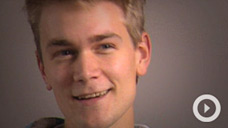

Watch Jay Bonnar's journey from med school to midlife in scenes from "Doctors' Diaries." (Running times 10:26 and 9:32) Also, see bonus video of Jay watching scenes from the program. 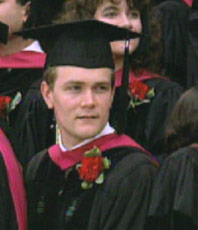
Throughout medical school, Jay Bonnar struggled with the sense that he wanted to become a different kind of doctor than most of his classmates. 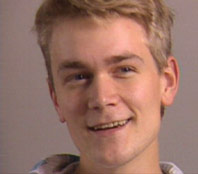
As a first-year med student, Jay agreed to have his life documented by NOVA's cameras, a decision he later, at times, regretted. 
Many, if not most, of the skills he practiced as a medical student are no longer relevant to his work. 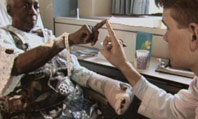
While initially trained to focus on the physical, Jay is now in a field where "the focus is humanity in its broadest sense." 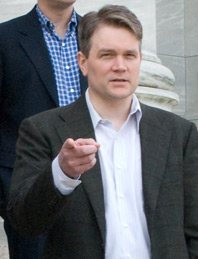
For a psychiatrist who rarely shares details of his life with patients, Jay finds being in front of a camera awkward. |
|
Interview conducted in July 2008 by Michael Barnes, producer of "Doctors' Diaries," and edited by Susan K. Lewis, senior editor of NOVA Online Doctors' Diaries Home | Send Feedback | Image Credits | Support NOVA |
© | Created February 2009 |
|
|
|








